How we won Thack 2015 Berlin

Hi GT!
My name is Denis Tsyplakov, I am Solution Architect in DataArt.
At the end of February of this year, the DataArt team participated in the travel hackathon of THack 2015 Berlin and won the main prize for large teams. Hackathon conducted an online magazine Tnooz.
Below I will tell you how it was. And why we won.
')
Briefly about the competition.
Tnooz is one of the largest information resources on technology in the field of tourism.
It has existed since 2009. The main subject of the publication is travel-technology. Experts writing for Tnooz about trends and industry prospects live all over the world. Kevin May, the editor and one of the creators of the resource, had been the editor in the famous English magazine Travolution for about four years before that.
In addition to online news and analytics, Tnooz leads a series of successful projects: THack hackathons, TLabs presentations, Appy Hour series of meetings and various webinars.
The most notable of these projects is THack, hackathons for resource developers and travel-related applications. Tnooz has already held nine such events in six countries. At various times, THack winners included travel industry giants such as Amadeus, and talented singles who worked without the support of a team.
It all started with the newsletter from Tnooz.com - we received the good news that the next THack will take place not far away - in Berlin. We quickly ran to Skyscanner and, inspired by low prices, decided that we should go anyway.
A brief explanation of who we are. In DataArt there is the concept of "industrial practices" - groups of people working with any industry (for example, finance, online travel, healthcare). "We" in this case - the initiative group Online travel-practice. Read more about what we do and with whom we work, here .
Prior to this, our Online travel-practice has already participated in contests, and this allowed us to get enough interesting customers. But recently the situation has changed, and according to the new rules, developers must be present at the competition locally. Taking the team for 24 hours to San Francisco or Delhi is not an easy task, and Berlin was just an excellent opportunity for us.
As usual, we decided to pre-arrange the piano in the bushes, and about two weeks before the start of the competition, we thought of what to show and started working on the application. The idea was quite interesting and was built around bluetooth beacons and bus tours. THack started on February 28th, 26th, everything was ready with us, it remained to polish the UI and, maybe, to earn some money for integration. The team packed up and prepared to go.
We drove the following composition.
- Backend / .NET developer - Dmitry Vyroskov.
- iOS developer - Yaroslav Vorontsov.
- Just in case, help if something goes wrong / can write in Java - Denis Tsyplakov.
From Los Angeles, we were met by Roma Peskin, a solution consultant who knows the travel industry from and to, which was supposed to give the idea the proper brilliance and present it all on stage. At the same time, the general mood was the following: “it is not necessary to win, the main thing is to light up”.
Early in the morning, the Voronezh part of the delegation met at the VOZ airport, and Dima, who had time to read the mail in the morning, delighted us with the news that Roma did not want to present the blank. He wants to win, and he has an idea how to do it.
At 7 in the morning, this idea, of course, reached our brain, but it did not cause much boiling up there. Two hours later, a gang of the team landed in the DME, and it began to reach us that we were going to participate in the hackathon completely unprepared. That is, we have with us, except
- One iOS developer.
- One universal soldier with a focus on .NET and JavaScript in the face of Dima.
- One Java backend developer represented by Denis.
- The promise of Roma in the evening to provide us with a detailed idea - what exactly are we going to do.
First, we sat in a circle and quickly began to check whether everything necessary for work was installed on laptops, whether the server raised in AWS EC2 feels good, and whether everyone can reach GitHub. According to the mind, this should be done at home, but, as I mentioned, we were a little relaxed.
Secondly, it was time to board the plane, and we flew to Berlin. Reaching the hotel and settling, we finally found Roma in the hotel’s restaurant and
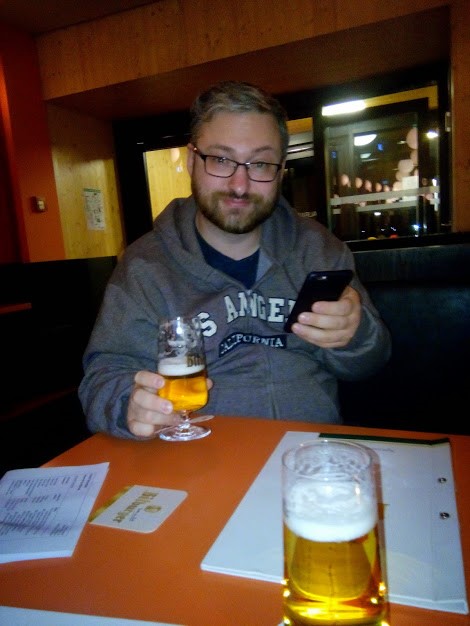
Roma: “Well, guys, are you ready to walk?”
The plan was as follows:
- Win thack.
- For this, it is necessary to satisfy the requirements of the jury as fully as possible.
Here I must say that to some extent we started to play dishonestly: Roma, as a person, was very well trained in the online travel industry, knew well what the jury was looking at. His thought was as simple as a hammer. Our homework is good, but with it we will not win. Because:
- It is evident that this is a blank, and the jury is not fools.
- It is necessary to use as many APIs as possible, and we use only one, and then only partially.
Roma had another, rather unexpected idea: to make a command line-interface to a combination of several alarm systems for planning trips by experienced travelers. As a member of the jury said later: “This is a bloody GDS via the web!”
On this positive note, we called a taxi and went to dinner in the center of Berlin.
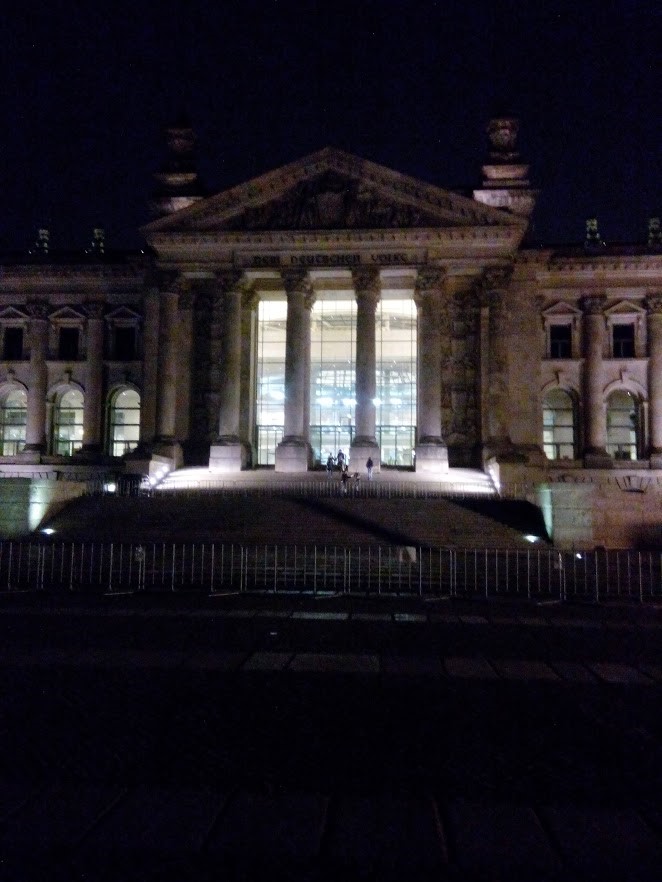
Somewhere in the center of Berlin.
In the morning of the next day we reached the competition venue. They greeted and embraced the aforementioned Kevin May (embraced Roma). The room was a semi-basement with bare walls, tables, a small stage and very good WiFi.
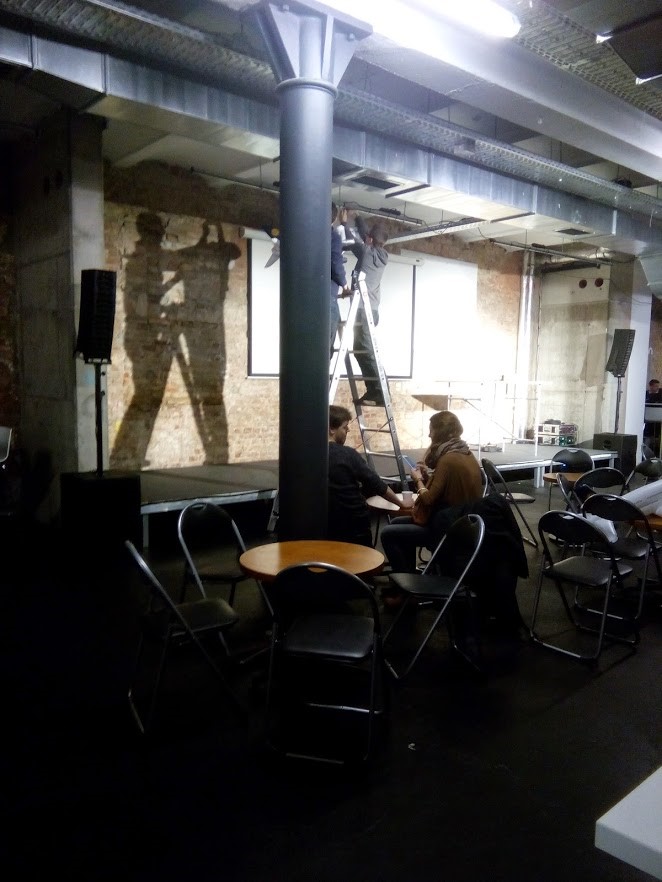
Preparing the scene.
Having seized the table, we spent 15 minutes thinking over and drawing on the paper the architecture of the future system and rushed to code.
It should be noted here that the choice of technologies was largely dictated by the range of available developers. And in general, looking back, our experience proves well: if developers have direct hands, technology is not so important.
The next 24 hours were spent in a tight clatter of keys with short breaks for food and very little for sleep.
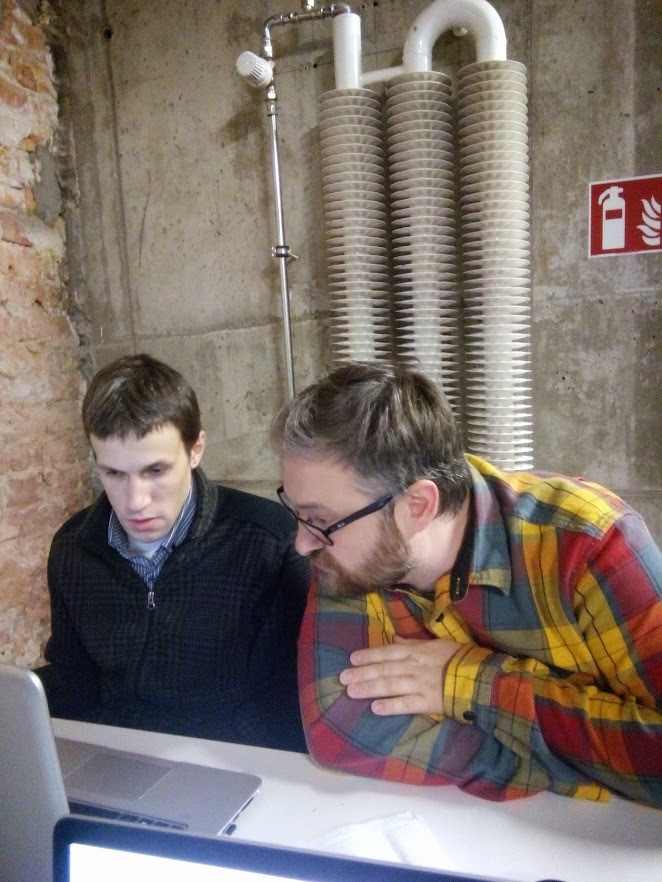
Dima Outgrowths, Roman Peskin.
On Sunday in the middle of the day, we slowly surfaced, having a more or less working alpha version that integrated with the API:
- Lufthansa (2 different APIs)
- Saber gds
- Foursquare
- Get Your Guide
- Google maps
- Uber
- Weather API
At the same time, it worked in the browser and in the iOS application and transparently skillfully transferred the session to / from there.
Do not forget: it was the same alpha version, made in 24 hours, and there a lot was sewn on a live thread.
At 12 o'clock we had a draw, and about 20 participants of the competition began to show applications. We were nervous at that time, we polished a number of thin spots in the app and helped Roma prepare a 5-minute presentation.
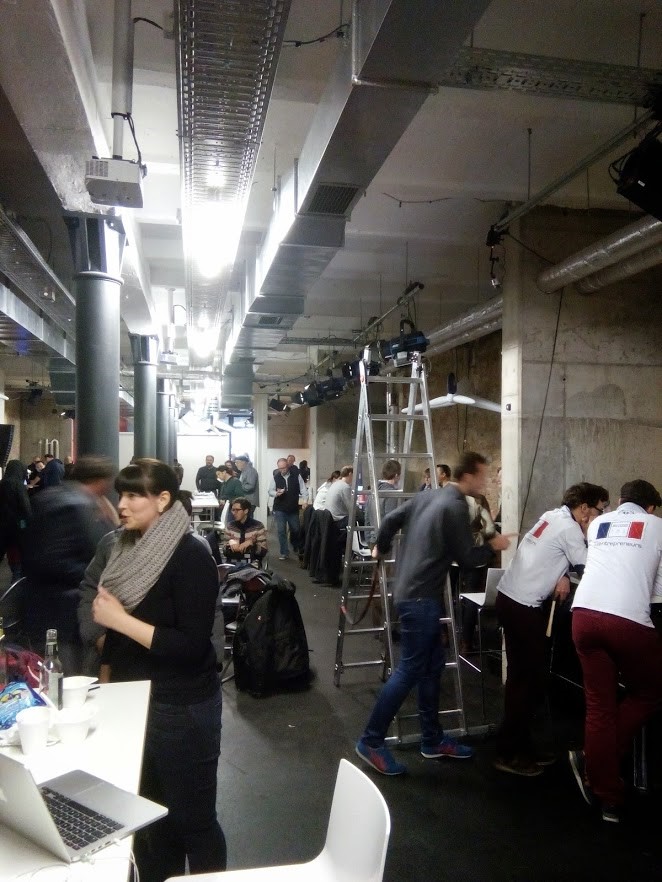
The last spurt, everyone is running and scurrying around.
In about three hours, we polished the presentation and application to shine. Along the way, listened to the presentations of other teams. An interesting point is that almost all projects had the following idea at the base: “It is necessary that the user think less and choose less. Do not give him a choice. Immediately sell something to him. If he chooses, he will leave the site. ” Against this background, our application with text commands and a fairly extensive system of selection of the tour looked like an alien from the perpendicular world.
The moment of presentation has arrived. Actually, I can tell about him a little - it was exactly five minutes, because, as Roma said, “presentations that are longer than five minutes on THack never win”. The presentation was vigorous, saturated, in a subject, without water. We prepared in advance: the projector showed the laptop screen, and then when the session jumped from the browser to the iPhone - the phone screen.
Then it is time to announce the results, and - exit !!! - we occupy the first place in the nomination for large teams. And second, in a special Lufthansa nomination.
Read about the results and see Romina presentation with the results here http://www.tnooz.com/article/thack-berlin-winners-presentations-pictures/
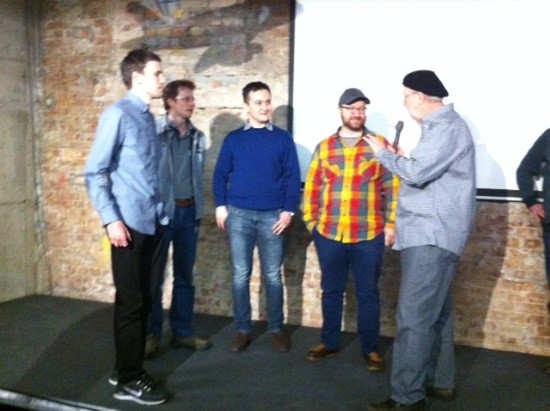
Dimitry Vyrostkov, Denis Tsyplakov, Yaroslav Vorontsov, Roman Peskin and Gene.
Then it was, in general, not so interesting. We listened, gathered and went to the bar to sum up.
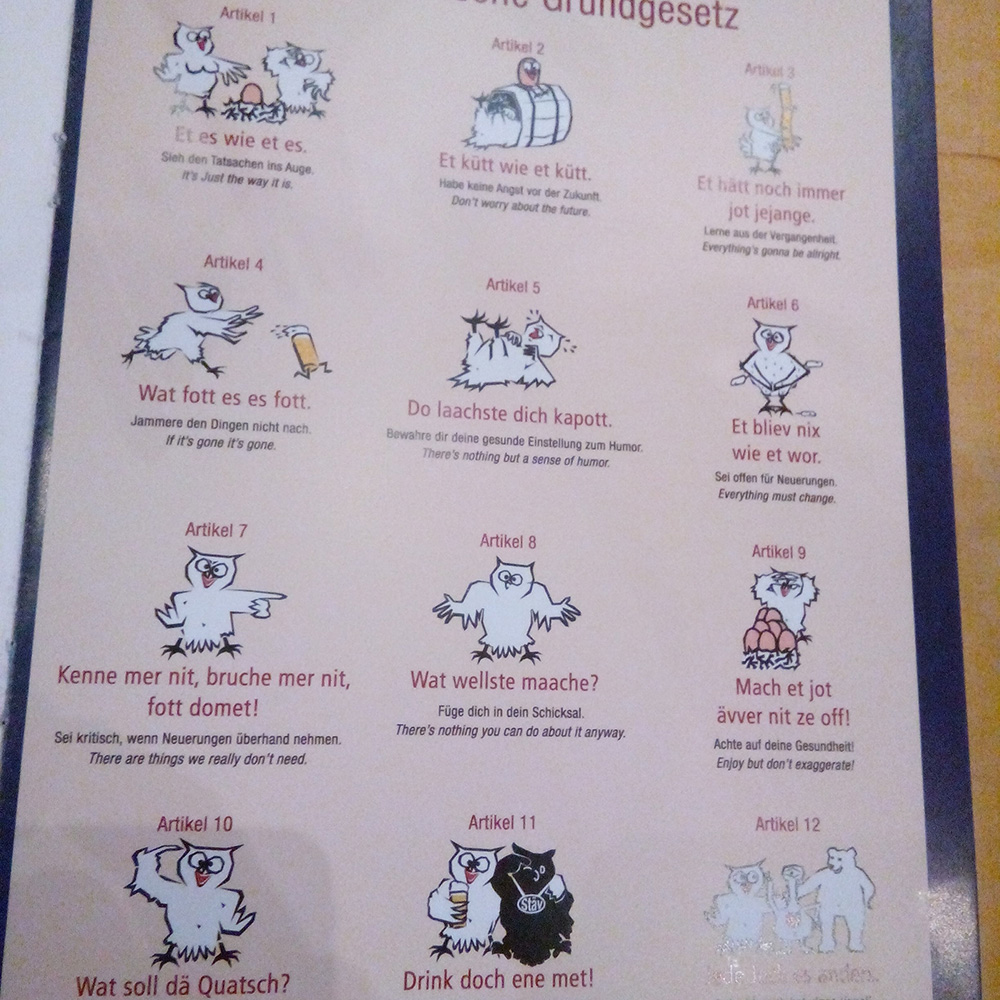
The picture below shows schematically the architecture of our application.
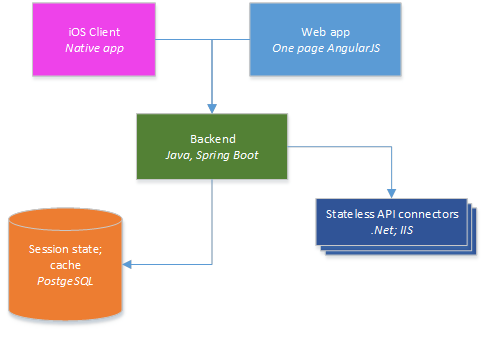
Members
| Name | Role | Tech stack |
| Roman Peskin | captain | Macbook, pen, club |
| Dmitry Vyrostkov | team / tech lead frontend developer | JavaScript, .NET |
| Yaroslav Vorontsov | iOS developer | iOS native |
| Denis Tsyplakov | backend developer | Java |
In conclusion, I want to say that it was quite an interesting experience. THack was held on the eve of the landmark in the travel-world exhibition ITB 2015, and the first place in THack greatly added us points and pumped our reputation.
One of the main lessons that I learned: if you want to win, set yourself the task of winning, and not "to participate and, perhaps, win." As competitors said while parsing the flights at the bar, DataArt won was not fair: instead of young startups, the outsourcing company brought three evil experienced experts led by a cunning fox who knew all the moves and exits. All I can answer is that we wanted to win and tried as best we could.
Source: https://habr.com/ru/post/367201/
All Articles